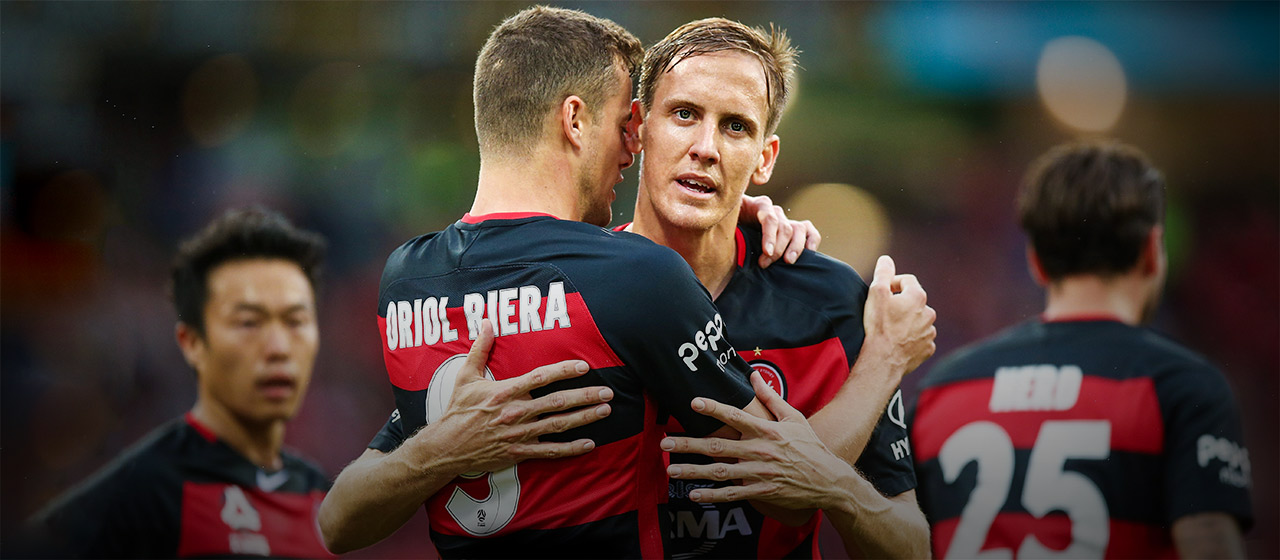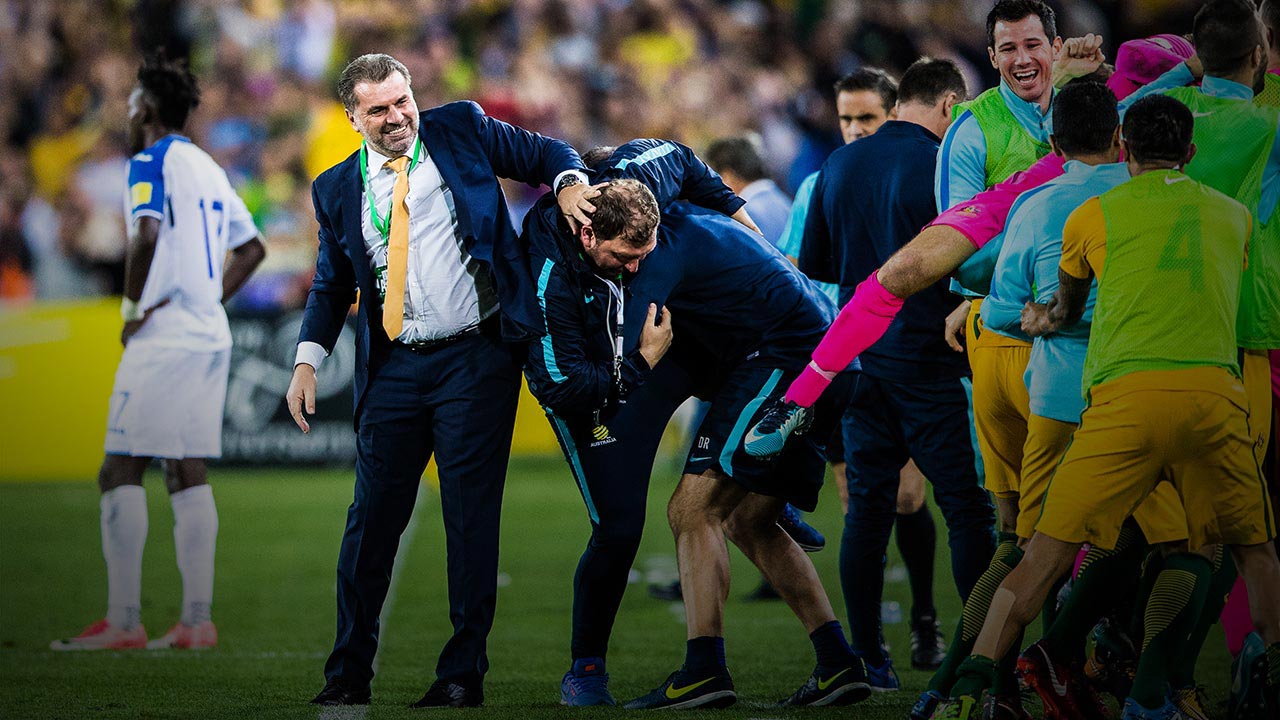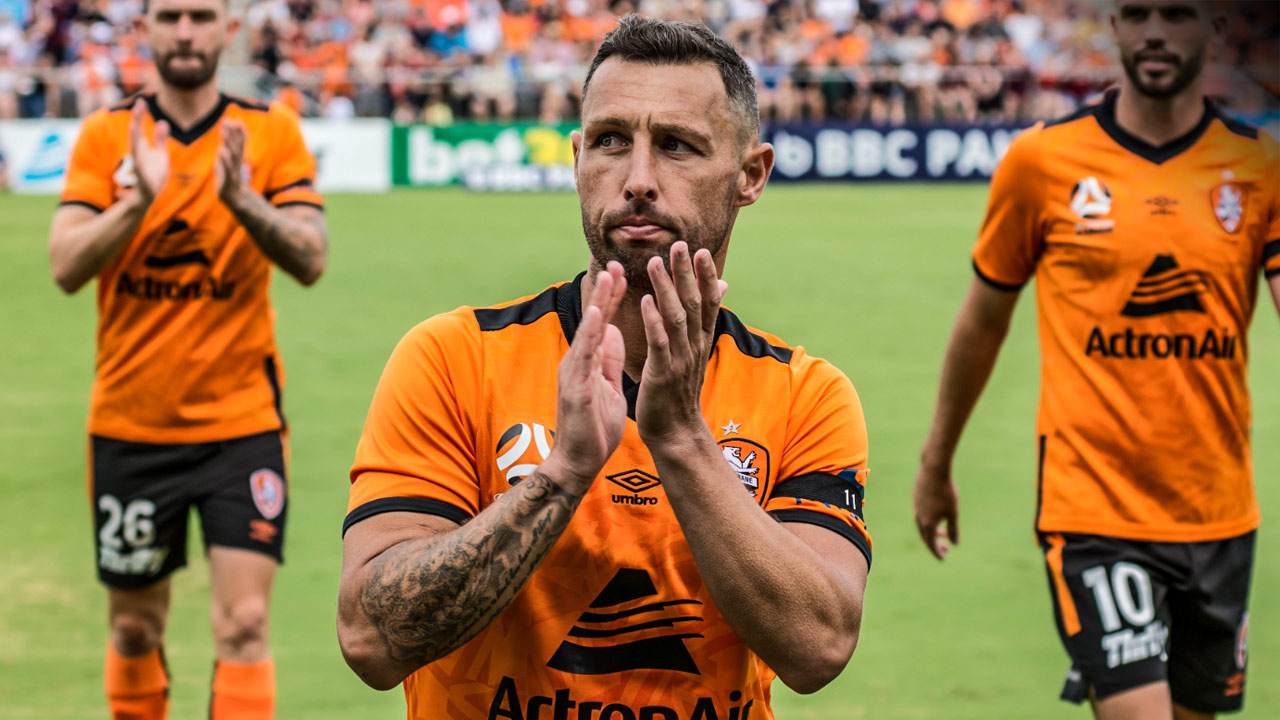Football
Why I’m living two lives
I have the best job in the world but it’s easy to get caught up in that dream. There was a time, not so long ago, when I didn’t realise the impact my career was having on the most important people in my life. I do now.
I’m living two lives at the moment, which comes at a cost both personally and financially. One is my family life on the Gold Coast, with my wife Chantelle and our daughters Madelene and Portia. The other is my football life, which I’m holding onto while I still can – living and playing in western Sydney.
Any financial advisor worth their salt would say it’s not worth it. But to me it is. For a little bit longer, at least.
Every ex-pro I’ve talked to says, ‘Play for as long as you can and earn as much as you can because when your career is finished, there’s no bringing it back.’
I’m very grateful for what I’ve earned from my career. It has allowed me to provide a great life for my family and I’ll never forget that. But, looking back, I can honestly say it’s never been about the money for me.
My first contract was $10,000 to join Marconi. I signed on a five-year deal because I didn’t care. I only ever wanted to feel like a professional.
As an athlete, it’s hard to just be happy with what you’ve got. We’re always trying to achieve something more.
At 34, I think I am capable of playing for another couple of years no problem, but the question now comes – is playing on fair on my family?
Before I moved to China at the start of 2016 to play a season with Liaoning Whowin, my wife and I had a difficult chat. Chantelle has always supported me with my career but she told me she couldn’t move around anymore.
At the time, I couldn’t understand it. I just wanted my family with me.
They moved back to the Gold Coast and what I’ve learned since then is that my wife was right. We can’t keep moving around because it will start affecting our girls. A cycle of moving home, making friends, getting settled and then moving on again. That wouldn’t be fair on them.
But for me, living away from my family won’t work long-term either. It has taken a huge toll. I know I’ll have to make it up to Chantelle and my daughters when I retire.
I’ll be a slave in my second life but I’m fully prepared for that; more than that I am looking forward to when that time arrives.

WEEKLY FLIGHT HOME
I didn’t expect Gold Coast United to fall over after just three years.
When the licence was taken and the club folded, it felt like the rug had been pulled out from underneath the family.
We’d bought a house there and were settled. But that’s football. Things change all the time.
Now, I catch a flight from Sydney to the Gold Coast every day off I get, which is usually only once a week. That day is supposed to be your time to relax but I’m always heading home to see my wife and kids.
Our time together is over all too quickly and at the airport, when I’m leaving, my littlest one is usually in tears.
Every time, I’ve said to my wife, ‘What the hell am I doing? What are we doing?’
It was a lot harder in China, though, because I probably saw my family four or five times in that whole year. Whenever we had an international break, I’d get four days off to return to Australia. I’d spend two of those in transit.
Now, it’s a one-hour flight to the Gold Coast but it’s still tough when you’ve got to be back for a double training session the next day.
It’s harder on my wife. We’ve never really lived in a city where we’ve had family around to help. Chantelle has almost had to be a single mum to our girls. Some people can’t handle one weekend on their own without their partner there to help with the kids.
She is far from the WAG stereotype you see in the newspapers and magazines. I don’t think any wives of A-League footballers are like that. The incomes just aren’t big enough.
Chantelle is a qualified sonographer so it has been important for her to keep working because if she took a year off work, she’d lose her accreditation.
We’re lucky that the companies she has worked for have been so understanding of our family’s situation. In my occupation, we don’t have that. I suppose that’s the nature of a competitive sporting environment. If you miss training or a game, then someone will replace you, no matter what the circumstances are.
At 34, I think I am capable of playing for another couple of years no problem, but the question now comes – is playing on fair on my family?
You’re expected to be at every single training session and travelling away every second weekend, no matter what.
Chantelle is scanning sick patients, detecting cancers and other major health problems. There is incredible pressure on her to perform but, if the kids are sick, her work is understanding and will allow her to stay at home.
It’s not something I have the luxury of doing as a professional athlete; that’s the sacrifice we make so I can continue my job.

HOW IT STARTED
I remember flirting with Chantelle at the water bubblers when we were at high school in Cairns. I knew her before she was successful in her career and she knew me before I was successful in mine.
When we were 17, we actually dated for a few weeks. I broke up with her because I thought it would affect what I wanted to achieve as a professional footballer. I had that backwards.
Years later, when I was 21 or 22, I had the opportunity to make amends.
Funnily enough, it started with a kiss at a party back home in Cairns. I remember sitting with Chantelle on her sister’s lounge and saying to her, ‘You don’t want to be with me. You don’t know what this life will entail.’
I was playing for National Bucuresti in Romania at the time and I knew the travel involved. I was on the road with my club, flying overseas with the national teams and then back to Australia to see family when I could.
I’d seen what that life does to relationships. I’d seen teammates break up with girlfriends because they couldn’t hack it.
Chantelle was focused on completing her degree and I was trying to get an education in football. It wouldn’t be easy.
Funnily enough, it started with a kiss at a party back home in Cairns. I remember sitting with Chantelle on her sister’s lounge and saying to her, ‘You don’t want to be with me. You don’t know what this life will entail.’
She wasn’t having a bar of it though. She knew we could overcome any challenges of a long-distance relationship. I’m so glad she didn’t listen to me.
Pretty soon, I was flying back to Romania. We worked it out so she could live with me for three months in Europe and then come back to Australia for three months to study.
The world was a completely different place then. We were writing letters and emails, nothing compared to the access we have now with Messenger, WhatsApp, social media and 24-hour connectivity.
International calls were so expensive. One time, Chantelle got so sick of using phone cards that she used her mobile and racked up a $2,000 Telstra debt.
We laugh about it now. I’ll read her some of the emails we sent to each other when we were first together. Everything happened really quickly and it wasn’t long before we got engaged and started talking about dates for a wedding.
I was happy to just go with the flow.
TRUST & LONELINESS
People make jokes about how rules don’t apply when you’re living in a different postcode to your partner. Imagine living in different countries as 22-year-olds!
To make it work, you both have to have complete trust in the other person. Since the moment I committed to Chantelle, I haven’t looked sidewards. There was no turning back for me.
I can only imagine how hard it would have been for her to be in a relationship with a professional footballer living on the other side of the world. She deserves full credit.
The other thing that is tough about long-distance relationships is the loneliness.
You have to create your own little family with the other players. They help you through the tough times. I’ve been lucky to play alongside many Aussies overseas.
When I was playing for Wisla Krakow in Poland, I was lucky to have Jacob Burns as a teammate. His family lived with him and, by extension, they became my family too. They always made me feel at home, but it’s never the same.
It was hard going for dinner and seeing them all together, happy and enjoying each other’s company and then going home to an empty unit.
That loneliness just rips you to pieces. I’m an over-thinker and it made me anxious being on my own like that. I’d go for two-hour walks just to clear my head.
Now, my wife needs time alone. As a mother, she never gets a moment to herself anymore. She can’t stand it when I complain about living on my own in Sydney.
When I hear a baby crying in public, or I see a single mum or dad on a plane, it doesn’t bother me. My wife has flown on plenty of red-eyes with newborns alone. I can’t imagine what she has been through. That’s a different kind of loneliness.
You just want a helping hand but there is no one there.
THIS ISN’T A NORMAL JOB
I hope I don’t sound ungrateful for my career. I’m very lucky to be able to travel the world, getting paid to play football. I’ve seen some incredible things.
One moment that stands out is from my time in Poland playing for Wisla.
I made my debut for them in one of football’s fiercest derbies. The rivalry between Wisla and Cracovia is known as The Holy War. There have been deaths. In Krakow, there are certain parts of the city you can’t go to – territories are marked out by graffiti. For a kid from Cairns, it was another world.
The supporters of Wisla had spent the year collecting the scarves of Cracovia fans. On match day, they hung them on the fence around the pitch and lit them on fire as we walked out. It was as if the whole stadium was up in flames.
I’ll never forget the intensity of the atmosphere.
This isn’t a normal job. It’s not real life. It’s not a nine-to-five grind. Starting a new career when I retire won’t be easy.
The comfortable thing would be to go into coaching. I’ve finished my C- and B-Licences and this year I’ll do my A-Licence. I don’t know if it’s something I should pursue, though.
In the A-League, the average coaching job lasts just 30-odd games and then you’re done, or moving on to another club and another city. There’s even more uncertainty than what you have as a player. I don’t want to do that to my family.
I know I’ll have to make it up to Chantelle and my daughters when I retire. I’ll be a slave in my second life but I’m fully prepared for that; more than that I am looking forward to when that time arrives.
My wife tries to tell me what life is going to be like after football – that it will be a big reality check. I know I’m lucky that Chantelle will be working. I’d feel a lot more pressure if I had all the financial responsibility.
I want to be a provider for my daughters. Ever since Chantelle got pregnant while I was at Melbourne Victory, I’ve known I had to shoulder that responsibility.
My eight-year-old, Portia, rides horses. Madelene is five and she wants to be a ballerina.
I’ll support them in whatever they want to do. Just like my family has supported me.
More about: A-League | Western Sydney Wanderers






 Load More
Load More